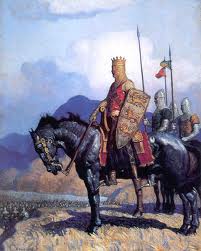Richard, Luca and a tiny little sportscar…
Until I began researching for the Gisborne books, I knew very little detail about Richard the Lionheart’s history – that is beyond the glib oneliners: ‘A Crusader par excellence’, ‘He would sell England if any would buy it.’ Always between Hollywood and the history and romance had been the image of a tall, proud man with red-gold hair who was as strong as an ox and who had a mother of whom even Popes were afraid.
All I recalled from university lectures decades before was that when Richard was caught by Leopold of Austria’s men, he was ensconced in Dürnstein Castle and a unbelievably high ransom price issued. The detail of his journey from Jaffa to that confronting moment was something lecturers conveniently and sadly left out.
Enter David Boyle with Blondel’s Song, published in 2005. Based on popular history, on legitimate records of events, on hearsay and rumour, this is the most enlightening and exciting history of Richard that I’ve read. Richard – hero of Christendom, now reviled and defamed because of petty jealousies and less than politic diplomacies; a man who both Phillip of France and Leopold of Austria wanted to drag down into the muddy waters of history.
I have sailed on a galley that one could smell many leagues far distant. I didn’t know that the odour of urine and sweat could waft across the seas and give ships knowledge of another vessel’s approach even before the craft could be seen. I have lived in fear of sea-storms and the knowledge that my buss with its low seaboard could quickly fill with water from a wind of between 11-16 knots, a wind I hasten to add which in our own boat would be uncomfortable and potentially ill-advised but rarely life-threatening. Richard however, with clever thinking and being in a less safe and predictable craft, bribed pirates to swap two better-adapted boats for his one.
I have ridden from Aquileia disguised as a merchant, then as a Templar and back to merchant again, desperately trying to push through the mountains in December to get to Hungary and likely supporters of the King before the snows cut us off from any chance of safety. I have watched the King sweat fevers and suffer dysentery from which he had never fully recovered in the Holy Land and finally … finally…
I watched him pull himself from his sickbed in Erdberg, drag himself to the kitchens and dress as a cook to try and disguise himself from Leopold’s men who had tracked him down. I watched him taken prisoner and I stood there wondering how pride and a ridiculous tantrum had bought him to this point. Quite simply he couldn’t bear to see Leopold of Austria’s flag hanging beside his own and Phillip’s on the walls of Acre. He pulled it down and stamped on it, they say, and thereafter he would pay the price. And what a price it was!
All this is just grist to my own mill. I’m not writing a story of Richard I, but I am writing a story of a family loosely connected with him and his foolhardiness. I’m writing a story about Templars and merchants, spies and noblewomen, but especially I’m writing a story about a little boy who through no fault of his own, inherits the name Gisborne. Richard’s story is inspiration for my own story and this last piece of detailed reading is all I need to speed the plot on its way. Will it be a copy of Richard’s heady adventure? Not at all – and certainly not in Carynthia, Styria and Austria.
But maybe in Aquitaine…
Perhaps Toulon and a wonderful eleventh century Templar commanderie…
And certainly in England near ‘Locksley Abbey’ (poetic licence)…
I must go … Gisborne and Tobias are on their way from Venezia to Trieste to try and find news of Richard’s whereabouts and they need my map!
NB: In my reading, I found significant mention of Udine being one of the places to which Richard and his very small party would have headed in their journey toward the friendly Eastern European states. Whilst I haven’t been to Udine, I remember once on a train from Florence to Innsbruck, my keyring (a tiny metal sportscar) caught the eye of a little boy called Luca.
He spent much of the journey as far as Bolzano playing with the car and chattering away to me in childish Italian. His mother informed me they were from Udine and the name stuck in my head from then on. The little boy was perhaps two and filled with charm and energy. He had dark blue eyes and almost black hair and could, quite easily, have been William of Gisborne…
Life’s funny isn’t it?







That book looks interesting indeed, Prue. As for the little blue-eyed dark-haired boy, he must have been waiting in your subconscious all these years, waiting for an opportunity to come out.
It is extremely interesting – probably because it is essentially a ‘popular’ history rather than an academic history. But I’ve read a few books on Richard now and many do tend to gloss over the journey from Jaffa to his capture by Leopold’s men. To me that is the most interesting. It’s not well documented and to find a non-fiction author willing to place the various legends out there for public consumption is a welcome breath of fresh air. I enjoyed it.
Funny about little Luca, isn’t it?